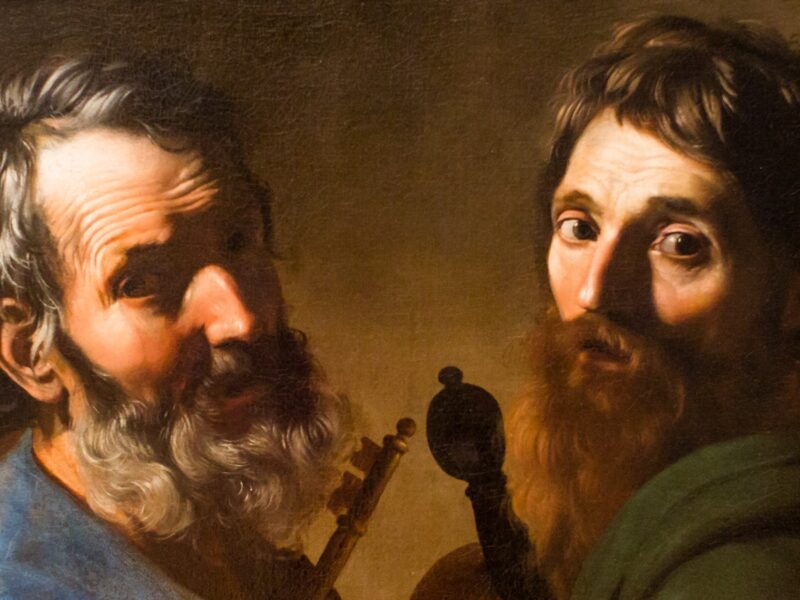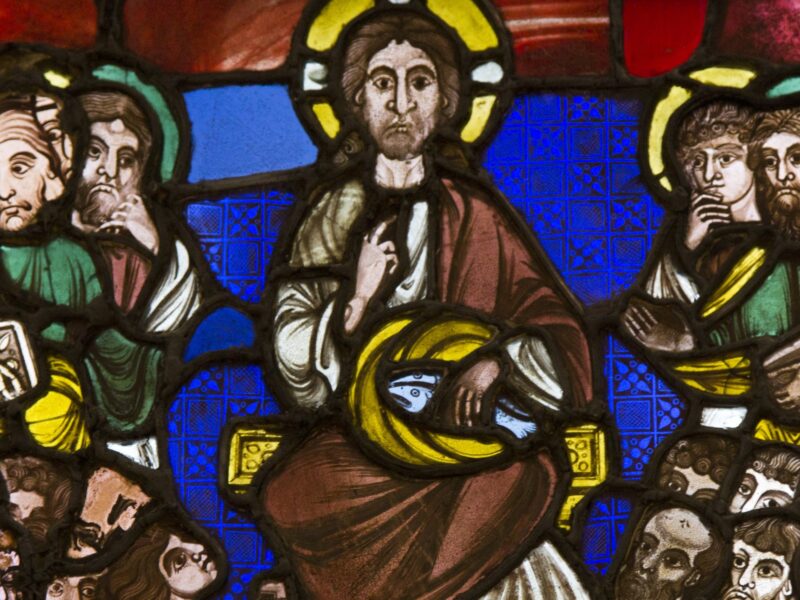
A Mystery of Hope
The Ascension of the Lord. Br Thomas Mannion preaches on the relationship between Ascension, the Incarnation, and the mission of the Church.
The Ascension of Jesus is like the Incarnation of Jesus, not only because in one he comes and in the other he goes but because it shows us God has the will and power to unite humanity and physical things, the created order, to himself. God wills that the physical order has a place in divine glory, but this happens not only in the life to come but here and now. In part we see this restoration of the Kingdom at Pentecost mentioned in today’s first reading when the disciples ask: ‘Are you going to restore the kingdom of Israel?’. The Spirit is sent at Pentecost to do just this and the Church is born. His Spirit comes to dwell in us. This sharing in divine glory also happens through sharing the divine mission which we read about in today’s Gospel.
Jesus is like us in all things but sin. This means that Jesus, while he is a divine person and not a human person, he nevertheless has not only a divine nature but a human one. It is because he has a human nature that he has a human body. This human body now sits in glory at the right hand of the Father to intercede for us, as the Church recites in her creed. This gives us hope that our redeemed and resurrected human bodies one day can be where he is, if we participate in his grace here and now.
In the Incarnation the divine and the human and brought together as never before, united in the person of Jesus Christ never to be separated. This gives us hope and symbolises and brings about what it symbolises – the reconciliation of the divine and the human. This human nature represents not only humanity’s reconciliation with God but creation’s reconciliation with God – and humanity’s reconciliation with the created order which since the fall had been an unharmonious relationship. We might look around at the world now and wonder if we live up to that harmony between God, creation, and us? Nevertheless, it is not, as St. John says, ‘so much that we loved him but that he first loved us’ and in another place: ‘even if our hearts condemn us, God is greater than our hearts’.
The Ascension, like the Incarnation, is a mystery of hope. It is because of the Ascension we can hope that where he now is bodily, we too after our resurrection may also be bodily. We can hope for this because we know a resurrected human body is now at the right hand of the Father. We can also hope, not only because of the Resurrection but also because of the Ascension, that our resurrected bodies will share in his glory.
We are told by Jesus in John’s Gospel that his returning to the Father is good for us. It is good for us because he goes to prepare a place for us and he will send us the Holy Spirit; more than this, we have a mission to focus on and ‘you will do greater works than these’. He is comforting his disciples who love him so much they are distressed by the thought of him leaving. Focusing on the mission enables us to look past our worries about whether God still abides with us.
Jesus Christ who has all authority on heaven and earth gives us the authority to fulfil our mission, which is a continuation of his mission: make disciples of all nations, baptise, teach others to follow all his commandments (which includes the command at the last supper ‘do this in memory of me’).
Though he has ascended to his heavenly Father, he is with us in a new way. His Spirit dwells in us. We are united to him by sharing in his Spirit, which is poured into our hearts through baptism, which we receive in the Eucharist; and though he is in heaven and we are in this present earthly life, he dwells within us. We have confidence in our mission, his work, his Kingdom, that one day we will be where he is, because of our union with him. He is with us always, yes, even to the end of time.
Readings: Acts 1:1-11 | Ephesians 1:17-23 | Matthew 28:16-20



Sean
Well done, Br Thomas! A little suggestion; if the sermon was geared a little more towards the heart than the head I feel it would have an influence on my life.
As a teacher, I always ask: “What do I want my students to remember or to act upon when I finish?” With this in mind I attempt to use a story – which we are told is the shortest distance between two hearts – or an incident to illustrate the point that I’m attempting to make.
It’s just a little constructive criticism which I hope will be of help!
Thanks again for your effort.
Catherine
Thank you so much. This is encouraging and in particular the words: ‘even if our hearts condemn us, God is greater than our hearts’. We can become discouraged with ourselves or by the way others treat us but it is comforting to know that God sees our efforts, even when we fail. Thank you Br Mannion
Michael
Thank you Brother-your words are inspiring and so encouraging.
It gives me a bit of an ascension too when you say “that one day we will be where he is, because of our union with him.”
Thank you for this work of breaking open God’s Word for me.